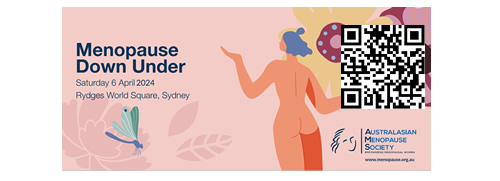If you're wondering why you entered menopause earlier or later than other women, blame your mother. That's because numerous studies have confirmed the role of genetics in determining a woman's age at menopause. A new study not only reconfirms this association but additionally suggests a link to familial longevity. Results are published online today in Menopause, the journal of The North American Menopause Society (NAMS).
The age of menopause is clinically defined as one year after the final menstrual period and is, on average, about 52 years. However, every year thousands of women outperform this statistic by entering menopause later in life, whereas many others naturally enter menopause much earlier in life.
Although menopause can occur earlier as the result of various conditions such as smoking, chemotherapy, and an elevated body mass index, the age of menopause is generally accepted to be most influenced by family history. So, if your mother experienced her menopause early, chances are you will also begin the transition earlier in life.
The goal of this latest study focused on reproductive life was to identify genetic variants associated with the delayed age of menopause based on familial longevity. Results were based on a meta-analysis of several larger studies, including the Long Life Family Study, the Health and Retirement Study, and the Framingham Heart Study. These studies found that women who were able to have children beyond the age of 40 years were four times more likely than average women of living to 100 years or older and that women who had children at age 35 years or older were 1.5 times more likely to live past 100 years.
In this study, researchers performed a meta-analysis for genetic variants associated with age of menopause in women who ultimately lived to a very old age. The findings provided further evidence for genetic basis of age of menopause. In addition, the discovery of new variants suggests that there may be genetic mechanisms of age of menopause that are linked to human longevity.
Abstract
Objective:
We hypothesize that mechanisms associated with extended reproductive age may overlap with mechanisms for the selection of genetic variants that slow aging and decrease risk for age-related diseases. Therefore, the goal of this analysis is to search for genetic variants associated with delayed age of menopause (AOM) among women in a study of familial longevity.
Methods:
We performed a meta-analysis of genome-wide association studies for AOM in 1,286 women in the Long Life Family Study (LLFS) and 3,151 women in the Health and Retirement Study, and then sought replication in the Framingham Heart Study (FHS). We used Cox proportional hazard regression of AOM to account for censoring, with a robust variance estimator to adjust for within familial relations.
Results:
In the meta-analysis, a single nucleotide polymorphism (SNP) previously associated with AOM reached genome-wide significance (rs16991615; HR = 0.74, P = 6.99 × 10). A total of 35 variants reached >10 level of significance and replicated in the FHS and in a 2015 large meta-analysis (ReproGen Consortium). We also identified several novel SNPs associated with AOM including rs3094005: MICB, rs13196892: TXNDC5 | MUTED, rs72774935: SSBP2 | ATG10, rs9447453: COL12A1, rs114298934: FHL2 | NCK2, rs6467223: TNPO3, rs9666274 and rs10766593: NAV2, and rs7281846: HSPA13.
Conclusions:
This work indicates novel associations and replicates known associations between genetic variants and AOM. A number of these associations make sense for their roles in aging.
Reference
Bae H, Lunetta KL, Murabito JM, Andersen SL, Schupf N, Perls T, Sebastiani P; Long Life Family Study. Genetic associations with age of menopause in familial longevity. Menopause. 2019 Jun 10. doi: 10.1097/GME.0000000000001367. [Epub ahead of print]
Content created 23 June 2019






